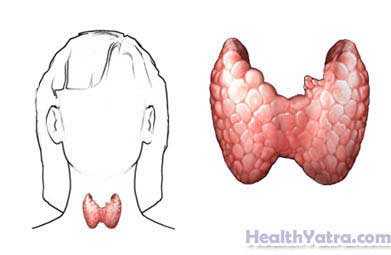Definition
The thyroid is a gland in the lower neck. It makes hormones that regulate growth, brain development, and metabolism. Hypothyroidism is a low or absent production of these hormones. Congenital means the conditions is present since birth.

If this condition is not treated it can cause damage to the brain. This can lead tointellectual disability and abnormal growth.
Causes
In most cases, the cause is unknown. The most common known cause is abnormal development of the thyroid gland. A small percentage of cases are inherited.
Babies born before 40 weeks may have a temporary shortage in the thyroid hormones.
Risk Factors
Factors that may increase the risk of congenital hypothyroidism include:
- Medication during pregnancy, such as radioactive iodine therapy
- Maternal autoimmune disease
- Too much iodine during pregnancy
- Inborn error of metabolism
Symptoms
Symptoms or signs take time to develop. The symptoms of Congenital hypothyroidism may include the following:
- Puffy face
- Coarse facial features
- Dull look
- Thick protruding tongue
- Poor feeding
- Choking episodes
- Constipation or reduced stooling
- Jaundice prolonged
- Short stature
- Swollen, protuberant belly button
- Decreased activity
- Sleeps a lot
- Rarely cries or hoarse cry
- Dry brittle hair; low hairline
- Poor muscle tone
- Cool and pale skin
- Goiter (enlarged thyroid)
- Birth defects (eg, heart valve abnormality)
- Poor weight gain due to poor appetite
- Poor growth
- Difficult breathing
- Slow pulse
- Low temperature
- Swollen hands, feet and genitals
Diagnosis
At birth, most infants are screened for this condition. Blood tests will be able to identify thyroid levels. Images of the thyroid may also be taken with:
- Thyroid scan (technetium)
- Nuclear imaging (scintigraphy) may help determine the cause of congenital hypothyroidism, which can guide treatment and prognosis
Treatment
The outcome is best if the condition is caught early. It is important to start treatment before the brain and nervous system are fully developed. If treatment is given early, it could prevent damage. Left untreated, the condition can lead to poor mental development and delayed growth.
Medication will treat the hypothyroidism. The medication will replace the missing hormones.
Once medication starts, the levels of thyroid hormones are checked often. This will help to keep the values within normal range. If values are kept within a normal range, there are no side effects or complications.
Prevention
Most cases can not be prevented. The following are some things the mother can do during pregnancy to reduce the risk:
- Avoid radioactive iodine treatment or iodine as antiseptic during pregnancy
- Consume enough, but not too much iodine during pregnancy
